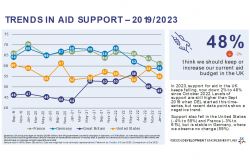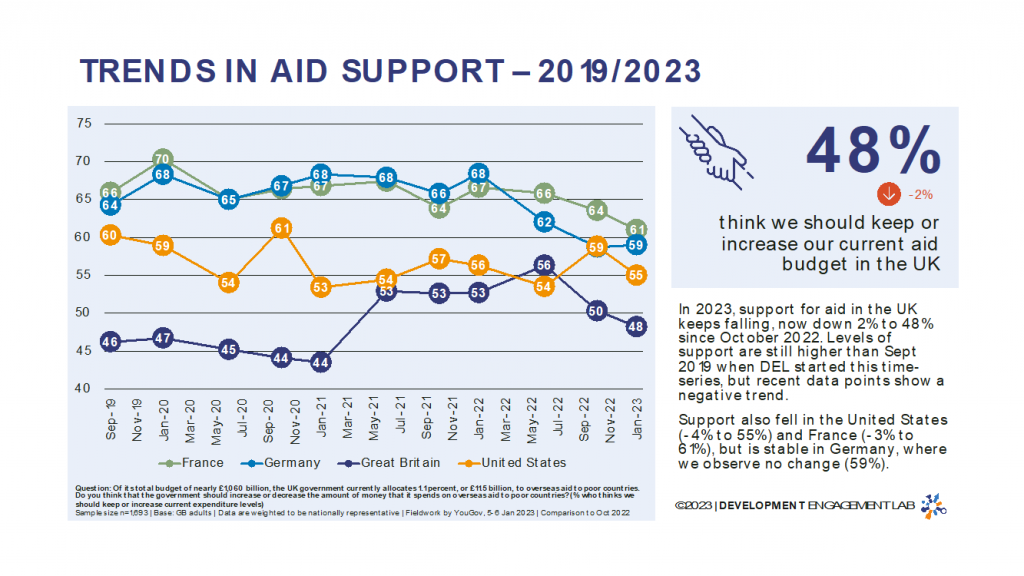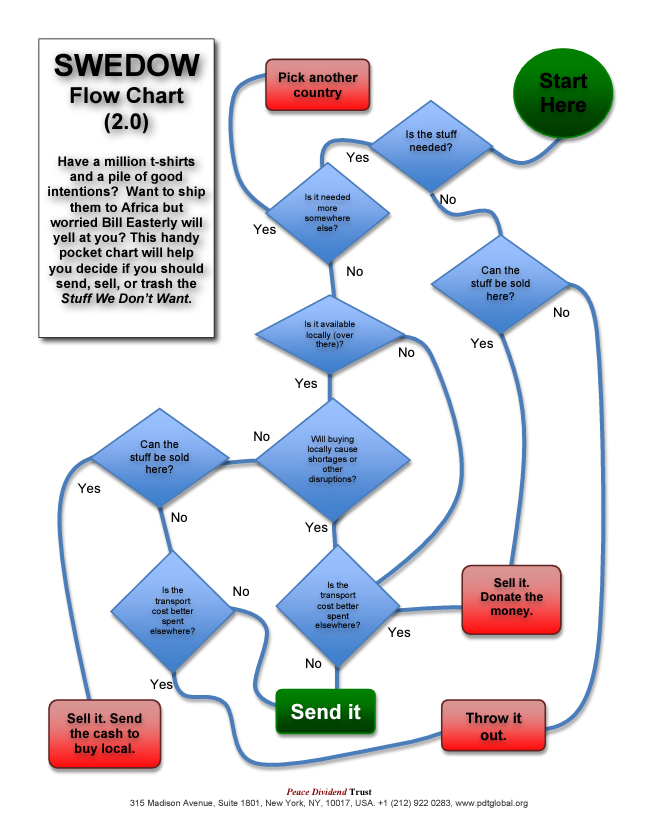Public Engagement with Aid: What do we know from 10 years of research?

Duncan Green on why concern, morality and guilt play important roles in our attitudes to aid.
Went to a big event on public attitudes to aid recently . Weird being back in conference mode – panels galore, a few lightbulb moments, buzzy coffee breaks, the occasional bit of powerpoint poisoning. Still struggling to make sense of it all. Let’s try.
The panel was presenting the findings of a 10 year research programme currently known most recently as the Development Engagement Lab, run by University College London and the University of Birmingham. Lots of serious quant stuff – surveys of 4-8,000 people in each country every few months, conducting experiments with different kinds of messages and information etc etc. These tend to produce a more messy, complex result than qual methods. That’s my excuse, anyway.
The starting point is that levels of public support for aid in the four case study countries (US, UK, France and Germany) have fluctuated a lot, against the backdrop of halved aid budgets (in the UK) and a doubled aid budget (in France’s case). DEL aims to get under the skin of this and see what’s going on, with lots of attention to segmenting the audience and the opinions and messages on aid and development that might allow government and NGOs to reverse the decline.
According to DEL’s David Hudson (DELboy?…), in the UK, the most important factors that affect support are efficacy (The feeling that an individual, an NGO, a government, etc. can make a difference), levels of need, and a focus on the basics – WASH, food security and health. Talking about gender equality and the environment actually reduces support for the average person. Uh-oh.
Things get even stickier when DEL gets into the wavering 20%. In the UK, roughly 50% of the population are sympathetic to aid (even though many of them thin k it doesn’t work, they just think it’s the right thing to do!). The rest are firmly in the ‘charity begins at home’ camp. In order to move from 50 to 70%, DEL has looked at the messages and framing that might work for the extra fifth.
k it doesn’t work, they just think it’s the right thing to do!). The rest are firmly in the ‘charity begins at home’ camp. In order to move from 50 to 70%, DEL has looked at the messages and framing that might work for the extra fifth.
Sceptics prefer aid to go on private sector development, jobs and infrastructure. Supporters generally prefer things like women’s rights or the environment.
So moving from 50-70% support implies a ‘back to basics’ agenda – Does it work? Does it go to the people who need it? Is it for the basics?
This opens a fascinating can of worms:
- Is this a fundamentally regressive agenda/portrayal of development, compared to where the sector is currently (power, institutions, inequalities etc)?
- People want the rule of law – but that creates a tension with the growing focus on fragile and conflict-affected states, where rule of law is weak or absent
- David Hudson advocated ‘different strokes for different folks’ – focus on different narratives to reach sceptics and supporters, but is it possible to micro-target in this way given the level of ‘message leakage’ between audiences (aka What will the Daily Mail say?)
- Alternatively, with an apparently centre-right agenda – ‘can we talk out of both sides of our mouths at the same time?’ Might we turn off core audiences when we try and win over sceptics?
In terms of how you go about shifting public opinion, Paolo Morini had some fascinating findings. He has looked at the interaction between actions and attitudes, looking for positive feedback loops where a positive attitude → an action → an even more positive attitude (e.g. concern motivates donation, leading to even more interest and concern). With various super complicated methodologies that were entirely over my head, he found that:
Actions change attitudes more than vice versa – reminiscent of Paolo Freire, but with numbers. So if you can get people to take one action, however marginal/dumb (think Ice Bucket Challenge or SWEDOW), you can trigger the start of a virtuous circle of commitment.

He found that concern and morality are the biggest drivers, but also found a weird positive feedback loop around guilt. Guilt leads to action, leads to….. more guilt. Is this the Catholic segment of the research?
Some final thoughts and questions:
The research finds mutual interest works better than national interest: ‘we’re all in this together’, not ‘this is good for Britain’. That clearly works for health and security, does it also work for inequality, I wonder?
Andrew Mitchell, the new-ish UK Minister for Development spoke at the meeting, and gave a masterclass in clear communications, but also how research can have impact. He loves DEL’s work and plans to use its methodology to set targets for his senior civil servants to increase support for aid. I imagine that is both because of its essentially conservative message on how to reach the extra 20%, and because he’s a Birmingham MP, and MPs love to support stuff in their home constituency.
It all felt somehow a bit retro (to me at least – open invitation to DEL peeps to explain what’s new), although there was an excellent panel on decolonising imagery around aid and shifting agency to the Global South. One of the perils of a longitudinal research programme (10 years in this case) may be that by the time you report your findings, the agenda may well have moved on.
Finally, where’s the theory of change? I can see why Andrew Mitchell wants increased support for aid, but how does that translate into more money, and how would more money translate into improvements in people’s lives? There are so many questions being asked about the quality of aid, the how, and the way it interacts (or does not) with the politics and power of players in the Global South, that it seems a bit odd to go back to an exclusive discussion on quantity and politics and public opinion in the North.
Overall, a good buzzy conference, with lots to learn and argue with. But I’d forgotten how exhausting they can be!
Here’s a DEL explainer video that is well worth 4 minutes of your time:
This first appeared on the From Poverty to Power blog.


